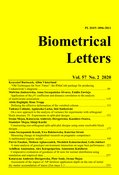
Biometrical Letters Vol. 57(2), 2020, pp. 195-220


This paper focuses on pragmatic competence development in second or foreign language learners. In particular, it attempts to fill the significant research gap in measuring change in pragmatic competence and capturing pragmalinguistic and sociopragmatic development over time. The paper proposes an innovative approach by applying a logistic model with multinomial distribution for measuring change in InterLanguage Pragmatics Research (ILP). Applied in the field of pragmatics, this statistical tool offers a comprehensive and flexible approach to modelling relations between independent and dependent variables in ILP research. The model is tested in a longitudinal study of Polish undergraduate students learning English, and specifically in the way they formulate requests by means of requestive directness strategies. The paper concludes that, regardless of time elapsing, the factors P (power distance) and D (social distance) have a highly significant influence on the use of requestive directness strategies by Poles learning EFL. Furthermore, the analysis indicates that the pragmatic output of Poles learning EFL is dependent on one more independent variable: the estimation of future social distance (F).

pragmatic competence, interlanguage pragmatics, longitudinal research, multinomial logistic model, EFL

